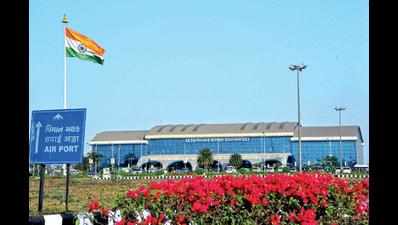- News
- City News
- surat News
- Dense fog in the city disrupt flight, train services
Trending
This story is from February 22, 2020
Dense fog in the city disrupt flight, train services

Fog blanketed the entire Diamond City with the morning temperature falling to 18°C
Surat: Dense fog enveloped Surat and parts of Bharuch and Navsari on Friday morning. Poor visibility even disrupted flight and train operations in the region with one Spice Jet flight from Delhi to Surat had to be diverted to Ahmedabad. Around five trains too were reportedly running late by more than an hour due to the foggy conditions.
The entire Diamond City wore a blanket of fog with the morning temperature falling to 18°C.The dense fog extended to other parts including Bharuch, Navsari and Valsad where traffic on the national highway too was affected.
Sources in Spice Jet confirmed that the Delhi to Surat flight with about 150 passengers had to be diverted to Ahmedabad owing to poor visibility for fog at the Surat airport. The flight was to arrive at 7.31 am at Surat, but after it had to be diverted to Ahmedabad, it departed at 9am to reach Surat airport at 9.31am, sources added.
A senior airport officer said, “The instrument landing system (ILS) is functioning at the airport, but only a pilot who is trained in ILS can land the aircraft when the runway visual range (RVR) is minimum 200 metres. On Friday, the visual range at the airport was more than 300 metres and the pilot could not land the aircraft and hence, it had to be diverted to Ahmedabad.”
Area railway manager, Surat railway station, CR Garuda said, “There was a dense fog situation from Bharuch to Surat and Navsari. About five trains including Mumbai-Vadodara Express, Gandhidham Express, Rajdhani Express, Garib Rath and Gujarat Queen were running late by 20 minutes to one hour. The traffic situation was normal after 10am.”
The entire Diamond City wore a blanket of fog with the morning temperature falling to 18°C.The dense fog extended to other parts including Bharuch, Navsari and Valsad where traffic on the national highway too was affected.
Sources in Spice Jet confirmed that the Delhi to Surat flight with about 150 passengers had to be diverted to Ahmedabad owing to poor visibility for fog at the Surat airport. The flight was to arrive at 7.31 am at Surat, but after it had to be diverted to Ahmedabad, it departed at 9am to reach Surat airport at 9.31am, sources added.
A senior airport officer said, “The instrument landing system (ILS) is functioning at the airport, but only a pilot who is trained in ILS can land the aircraft when the runway visual range (RVR) is minimum 200 metres. On Friday, the visual range at the airport was more than 300 metres and the pilot could not land the aircraft and hence, it had to be diverted to Ahmedabad.”
Weather department officials said that the minimum temperature in the morning dropped 18.7°C and humidity was recorded at 91%, which resulted in the dense fog situation.
Area railway manager, Surat railway station, CR Garuda said, “There was a dense fog situation from Bharuch to Surat and Navsari. About five trains including Mumbai-Vadodara Express, Gandhidham Express, Rajdhani Express, Garib Rath and Gujarat Queen were running late by 20 minutes to one hour. The traffic situation was normal after 10am.”
End of Article
FOLLOW US ON SOCIAL MEDIA










